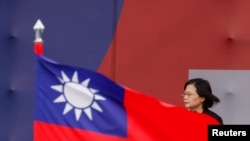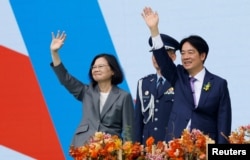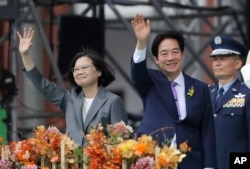Former President of Taiwan Tsai Ing-wen left office May 20, passing the baton to her Democratic Progress Party’s (DPP) successor, Lai Ching-te, also known as William Lai.
Analysts say her time as leader of self-ruled Taiwan saw it gain international support for a peaceful Taiwan Strait despite an increasingly assertive China – a legacy they hope President Lai can maintain.
Tsai was Taiwan’s first female leader and one of the few top female leaders in Asia and she ushered in some of the region’s most liberal laws on LGBTQ rights. Yet analysts say her foremost legacy will be the international attention and support she brought to Taiwan.
Hung-Jen Wang, a professor of politics at Taiwan’s National Cheng Kung University, tells VOA that Tsai's biggest achievement was her effectiveness in getting major nations to consider and confront the possibility of China using force against Taiwan and the global impact that would be caused by conflict in the Taiwan Strait.
"President Tsai has made it clearer to everyone that the stability of the Taiwan Strait issue is not Taiwan's issue, nor is it an issue of internal affairs between Taiwan and China, but (relevant to) everyone's national interests," Wang said.
Since the 2021 Summit of the Group of Seven (G7) publicly used the phrase "the importance of peace and stability in the Taiwan Strait" for the first time, the phrase has become an indispensable part of the joint communiqués of the G7 group of economically advanced democracies. The group is Britain, Canada, the European Union, France, Germany, Italy, Japan, and the United States.
Beijing claims Taiwan is a breakaway province that must one day reunite with the mainland, by force if necessary.
Russia’s 2022 invasion of Ukraine, which President Vladimir Putin has similarly claimed as part of Russia, and Moscow’s close ties with Beijing, have further underscored concerns that China could follow Russia’s lead in seizing territory by force.
China has in the past couple years increased its cross-straits threats, including military exercises, sending scores of suspected spy balloons over Taiwan, and interfering in its election with threats. Tsai increased military spending and submarine development to better defend Taiwan if China attacks.
Ryan Hass, director of the John L. Thornton China Center and the Chen-Fu and Cecilia Yen Koo Chair in Taiwan Studies at the Brookings Institution think tank in Washington, tells VOA history will be kind to Tsai, who took Beijing’s saber-rattling in stride.
“I think that she has been stable, steady, pragmatic, (and) principled. She has helped create conditions that have allowed Taiwan to attract more support from the rest of the international community than at any previous time. And really sort of pushed back against the notion that Taiwan can be isolated and intimidated by Beijing,” Hass said, adding that he hopes that Tsai’s successor “will carry forward the legacy of what she has left off.”
Tsai and Lai both support Taiwan’s status quo. Though Lai has in the past been an outspoken supporter of Taiwan independence, he has in the last few years softened his tone.
But Beijing’s Taiwan Affairs Office on Monday still denounced Lai as a “worker for Taiwan independence."
Michael Cunningham, a research fellow in The Heritage Foundation's Asian Studies Center, said China didn’t see Tsai as moderate, either.
“China has refused to engage officially in talks, but she has been very pragmatic,” Cunningham told VOA. “In fact, all parties essentially have the same general approach to China now, which is to preserve stability, preserve de facto sovereignty. Don't rock the boat, which is very important."
China has, however, engaged in talks with leaders of Taiwan’s opposition Kuomintang (KMT) party, who blame Tsai and Lai for stoking cross-straits tensions with Beijing.
During Tsai’s eight years in office, China convinced almost half of the nations that were recognizing Taiwan as a country to switch diplomatic recognition to Beijing. Only 11, mainly small island nations and the Vatican, recognize Taiwan as a sovereign nation.
Despite the lost recognition, analysts say Tsai successfully pushed trade and unofficial relationships that garnered more support for Taiwan’s status quo as a self-governing democracy.
Cunningham told VOA Tsai managed to make Taiwan well-known on the international stage. “...And in that way, she's done a great job for Taiwan diplomatically,” he said. “However, I hope President-elect Lai and his administration will be able to do a better job of holding on to the official diplomatic partners."
Lai inherits a politically divided Taiwan with the KMT wanting to engage with China and weaken his presidency.
Despite the tensions, Yao-Yuan Yeh, a professor at the University of St. Thomas, told VOA in a phone interview that Taiwan has already chosen its future.
"Tsai Ing-wen's biggest effort in the past eight years has been to help Taiwan choose the side of the United States in the environment of confrontation between the United States and China,” Yeh said. “That is, Taiwan will stand on the same front as democratic countries in the future."
Lai inherits an unprecedented third term in a row for the DPP, coming off of high ratings for his predecessor.
The latest survey released by Taiwan's TVBS Polling Center last week showed that Tsai's policy satisfaction before leaving office was 42%, 19 percentage points higher than former KMT President Ma Ying-jeou's 23% and 29 percentage points higher than previous DPP President Chen Shui-bian's 13%.
As for Tsai’s role after the presidency, Taiwanese media reports say she plans to organize an international think tank to continue advocating for Taiwan.
Adrianna Zhang contributed to this report.













